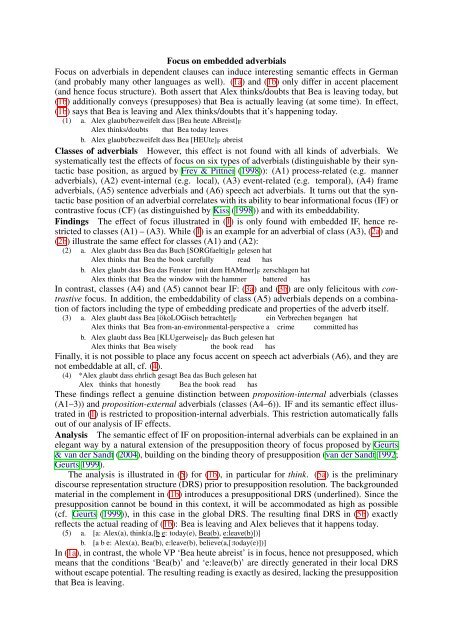Focus on embedded adverbials Focus on adverbials in ... - Linguistics
Focus on embedded adverbials Focus on adverbials in ... - Linguistics
Focus on embedded adverbials Focus on adverbials in ... - Linguistics
You also want an ePaper? Increase the reach of your titles
YUMPU automatically turns print PDFs into web optimized ePapers that Google loves.
<str<strong>on</strong>g>Focus</str<strong>on</strong>g> <strong>on</strong> <strong>embedded</strong> <strong>adverbials</strong><br />
<str<strong>on</strong>g>Focus</str<strong>on</strong>g> <strong>on</strong> <strong>adverbials</strong> <strong>in</strong> dependent clauses can <strong>in</strong>duce <strong>in</strong>terest<strong>in</strong>g semantic effects <strong>in</strong> German<br />
(and probably many other languages as well). (1a) and (1b) <strong>on</strong>ly differ <strong>in</strong> accent placement<br />
(and hence focus structure). Both assert that Alex th<strong>in</strong>ks/doubts that Bea is leav<strong>in</strong>g today, but<br />
(1b) additi<strong>on</strong>ally c<strong>on</strong>veys (presupposes) that Bea is actually leav<strong>in</strong>g (at some time). In effect,<br />
(1b) says that Bea is leav<strong>in</strong>g and Alex th<strong>in</strong>ks/doubts that it’s happen<strong>in</strong>g today.<br />
(1) a. Alex glaubt/bezweifelt dass [Bea heute ABreist] F<br />
Alex th<strong>in</strong>ks/doubts that Bea today leaves<br />
b. Alex glaubt/bezweifelt dass Bea [HEUte] F abreist<br />
Classes of <strong>adverbials</strong> However, this effect is not found with all k<strong>in</strong>ds of <strong>adverbials</strong>. We<br />
systematically test the effects of focus <strong>on</strong> six types of <strong>adverbials</strong> (dist<strong>in</strong>guishable by their syntactic<br />
base positi<strong>on</strong>, as argued by Frey & Pittner (1998)): (A1) process-related (e.g. manner<br />
<strong>adverbials</strong>), (A2) event-<strong>in</strong>ternal (e.g. local), (A3) event-related (e.g. temporal), (A4) frame<br />
<strong>adverbials</strong>, (A5) sentence <strong>adverbials</strong> and (A6) speech act <strong>adverbials</strong>. It turns out that the syntactic<br />
base positi<strong>on</strong> of an adverbial correlates with its ability to bear <strong>in</strong>formati<strong>on</strong>al focus (IF) or<br />
c<strong>on</strong>trastive focus (CF) (as dist<strong>in</strong>guished by Kiss (1998)) and with its embeddability.<br />
F<strong>in</strong>d<strong>in</strong>gs The effect of focus illustrated <strong>in</strong> (1) is <strong>on</strong>ly found with <strong>embedded</strong> IF, hence restricted<br />
to classes (A1) – (A3). While (1) is an example for an adverbial of class (A3), (2a) and<br />
(2b) illustrate the same effect for classes (A1) and (A2):<br />
(2) a. Alex glaubt dass Bea das Buch [SORGfaeltig] F gelesen hat<br />
Alex th<strong>in</strong>ks that Bea the book carefully read has<br />
b. Alex glaubt dass Bea das Fenster [mit dem HAMmer] F zerschlagen hat<br />
Alex th<strong>in</strong>ks that Bea the w<strong>in</strong>dow with the hammer battered has<br />
In c<strong>on</strong>trast, classes (A4) and (A5) cannot bear IF: (3a) and (3b) are <strong>on</strong>ly felicitous with c<strong>on</strong>trastive<br />
focus. In additi<strong>on</strong>, the embeddability of class (A5) <strong>adverbials</strong> depends <strong>on</strong> a comb<strong>in</strong>ati<strong>on</strong><br />
of factors <strong>in</strong>clud<strong>in</strong>g the type of embedd<strong>in</strong>g predicate and properties of the adverb itself.<br />
(3) a. Alex glaubt dass Bea [ökoLOGisch betrachtet] F e<strong>in</strong> Verbrechen begangen hat<br />
Alex th<strong>in</strong>ks that Bea from-an-envir<strong>on</strong>mental-perspective a crime committed has<br />
b. Alex glaubt dass Bea [KLUgerweise] F das Buch gelesen hat<br />
Alex th<strong>in</strong>ks that Bea wisely the book read has<br />
F<strong>in</strong>ally, it is not possible to place any focus accent <strong>on</strong> speech act <strong>adverbials</strong> (A6), and they are<br />
not embeddable at all, cf. (4).<br />
(4) *Alex glaubt dass ehrlich gesagt Bea das Buch gelesen hat<br />
Alex th<strong>in</strong>ks that h<strong>on</strong>estly Bea the book read has<br />
These f<strong>in</strong>d<strong>in</strong>gs reflect a genu<strong>in</strong>e dist<strong>in</strong>cti<strong>on</strong> between propositi<strong>on</strong>-<strong>in</strong>ternal <strong>adverbials</strong> (classes<br />
(A1–3)) and propositi<strong>on</strong>-external <strong>adverbials</strong> (classes (A4–6)). IF and its semantic effect illustrated<br />
<strong>in</strong> (1) is restricted to propositi<strong>on</strong>-<strong>in</strong>ternal <strong>adverbials</strong>. This restricti<strong>on</strong> automatically falls<br />
out of our analysis of IF effects.<br />
Analysis The semantic effect of IF <strong>on</strong> propositi<strong>on</strong>-<strong>in</strong>ternal <strong>adverbials</strong> can be expla<strong>in</strong>ed <strong>in</strong> an<br />
elegant way by a natural extensi<strong>on</strong> of the presuppositi<strong>on</strong> theory of focus proposed by Geurts<br />
& van der Sandt (2004), build<strong>in</strong>g <strong>on</strong> the b<strong>in</strong>d<strong>in</strong>g theory of presuppositi<strong>on</strong> (van der Sandt 1992;<br />
Geurts 1999).<br />
The analysis is illustrated <strong>in</strong> (5) for (1b), <strong>in</strong> particular for th<strong>in</strong>k. (5a) is the prelim<strong>in</strong>ary<br />
discourse representati<strong>on</strong> structure (DRS) prior to presuppositi<strong>on</strong> resoluti<strong>on</strong>. The backgrounded<br />
material <strong>in</strong> the complement <strong>in</strong> (1b) <strong>in</strong>troduces a presuppositi<strong>on</strong>al DRS (underl<strong>in</strong>ed). S<strong>in</strong>ce the<br />
presuppositi<strong>on</strong> cannot be bound <strong>in</strong> this c<strong>on</strong>text, it will be accommodated as high as possible<br />
(cf. Geurts (1999)), <strong>in</strong> this case <strong>in</strong> the global DRS. The result<strong>in</strong>g f<strong>in</strong>al DRS <strong>in</strong> (5b) exactly<br />
reflects the actual read<strong>in</strong>g of (1b): Bea is leav<strong>in</strong>g and Alex believes that it happens today.<br />
(5) a. [a: Alex(a), th<strong>in</strong>k(a,[b e: today(e), Bea(b), e:leave(b)])]<br />
b. [a b e: Alex(a), Bea(b), e:leave(b), believe(a,[:today(e)])]<br />
In (1a), <strong>in</strong> c<strong>on</strong>trast, the whole VP ‘Bea heute abreist’ is <strong>in</strong> focus, hence not presupposed, which<br />
means that the c<strong>on</strong>diti<strong>on</strong>s ‘Bea(b)’ and ‘e:leave(b)’ are directly generated <strong>in</strong> their local DRS<br />
without escape potential. The result<strong>in</strong>g read<strong>in</strong>g is exactly as desired, lack<strong>in</strong>g the presuppositi<strong>on</strong><br />
that Bea is leav<strong>in</strong>g.
References<br />
FREY, WERNER & KARIN PITTNER. 1998. Zur Positi<strong>on</strong>ierung der Adverbiale im deutschen<br />
Mittelfeld. L<strong>in</strong>guistische Berichte, 176, 489?534.<br />
GEURTS, BART. 1999. Presuppositi<strong>on</strong>s and Pr<strong>on</strong>ouns. Amsterdam: Elsevier.<br />
GEURTS, BART & ROB VAN DER SANDT. 2004. Interpret<strong>in</strong>g <str<strong>on</strong>g>Focus</str<strong>on</strong>g>. Theoretical L<strong>in</strong>guistics,<br />
30(1), 1–44.<br />
KISS, K. E. 1998. Identificati<strong>on</strong>al focus versus <strong>in</strong>formati<strong>on</strong> focus. Language, 74, 245–273.<br />
VAN DER SANDT, R.A. 1992. Presuppositi<strong>on</strong> Projecti<strong>on</strong> as Anaphora Resoluti<strong>on</strong>. Journal of<br />
Semantics, 9, 333–377.
















